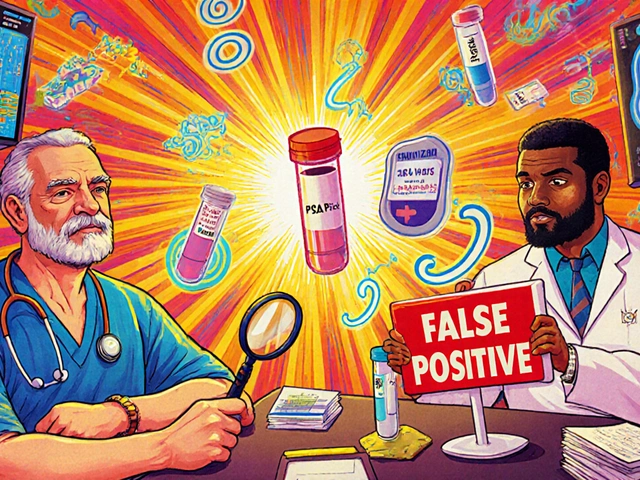Understanding Meclizine and Its Uses
Before diving into the topic of meclizine and pregnancy, it's important to have a clear understanding of what meclizine is and its common uses. Meclizine is an antihistamine that is primarily used to prevent and treat nausea, vomiting, and dizziness caused by motion sickness. It works by blocking certain natural substances in the body, called histamines, which are responsible for causing these symptoms. In addition to motion sickness, meclizine is also used to treat vertigo, a condition characterized by dizziness and a spinning sensation.
Meclizine is available over the counter, and it is also available by prescription in higher doses. It is typically taken as needed, but it can also be taken on a regular schedule for those who suffer from chronic symptoms. Since meclizine is an antihistamine, it can cause drowsiness and other side effects, so it is important to follow the recommended dosage and take it as directed by your healthcare provider.
Concerns About Meclizine During Pregnancy
As with any medication, there are concerns about using meclizine during pregnancy. The main concern is whether or not it is safe for the developing fetus. Pregnant women are often advised to be cautious about taking any medication during pregnancy, as some drugs can cross the placenta and potentially harm the baby. This is especially true during the first trimester when the baby's vital organs are forming.
There is limited research on the safety of meclizine during pregnancy, so it is difficult to determine if it is entirely safe to use during this time. Some studies have found no increased risk of birth defects with meclizine use during pregnancy, while others have reported a slightly increased risk. The conflicting results make it challenging for healthcare providers to provide clear guidance on the safety of meclizine during pregnancy.
Meclizine as a Treatment for Morning Sickness
One potential use for meclizine during pregnancy is as a treatment for morning sickness, a common pregnancy symptom that affects many women. Morning sickness usually begins in the first trimester and can cause nausea, vomiting, and a general feeling of malaise. While morning sickness is not typically harmful to the baby, it can be incredibly uncomfortable and disruptive for the expectant mother.
Meclizine has been used to treat morning sickness in some cases, as it can help to relieve nausea and vomiting. However, its use for this purpose is off-label, meaning it is not specifically approved for treating morning sickness. In recent years, healthcare providers have become more cautious about prescribing meclizine for morning sickness due to the lack of clear evidence on its safety during pregnancy.
Alternatives to Meclizine for Pregnant Women
If you are pregnant and concerned about using meclizine, there are several alternatives available that may be safer during pregnancy. One option is to try non-pharmacological treatments for nausea and vomiting, such as ginger, vitamin B6, or acupressure. These natural remedies can be effective in some cases, and they generally have fewer side effects than medications.
Another option is to talk to your healthcare provider about prescription medications specifically approved for use during pregnancy. One such medication is Diclegis, which combines vitamin B6 and an antihistamine called doxylamine. Diclegis has been extensively studied and is considered safe for use during pregnancy. Always consult with your healthcare provider before starting any new medication, especially during pregnancy.
Consulting with Your Healthcare Provider
In conclusion, the safety of meclizine during pregnancy remains unclear due to limited research and conflicting results. If you are pregnant or planning to become pregnant and are considering using meclizine, it is essential to discuss your concerns with your healthcare provider. They can help you weigh the potential risks and benefits of using meclizine and recommend alternative treatments if necessary.
Remember, every pregnancy is unique, and what may be safe for one person may not be safe for another. It is crucial to work closely with your healthcare provider to determine the best course of action for your specific situation and ensure the health and safety of both you and your baby.








June 18, 2023 AT 23:56
Anthony Griek
I took meclizine when I was pregnant with my first and it helped with the nausea so much. No issues with the baby. Just listen to your doc and don't panic over every little thing.
It's not magic, but sometimes you need a little help to get through the day.
June 20, 2023 AT 00:45
Norman Rexford
bro i read this whole thing and like 70% of it is just 'maybe its safe maybe its not' like can we just get a straight answer??
also why is everyone so scared of antihistamines?? we been using them since the 50s. my grandma took bonine while pregnant and i turned out fine lmao
June 20, 2023 AT 23:56
Wayne Keller
The key here is balance. Meclizine isn't some scary chemical-it's been around for decades. But since pregnancy is a unique state, we don't want to guess. Talk to your OB. If your nausea is keeping you from eating or drinking, that's more dangerous than the med.
And yes, ginger tea and B6 are great first steps. But if they don't cut it, don't feel guilty for needing more.
June 21, 2023 AT 23:41
Megan Raines
Oh so now we're treating morning sickness like a crime scene? 'Is it safe? Maybe? Probably? Consult your doctor.'
Wow. Groundbreaking.
June 23, 2023 AT 18:13
Mamadou Seck
meclizine is fine fr. i took it for 3 months straight and my kid is now 4 and runs like a cheetah. stop overthinking meds. your body knows what to do. also ginger is for people who think 'wellness' is a religion
June 24, 2023 AT 23:34
Shana Labed
YAS QUEEN! Diclegis is literally the MVP of pregnancy nausea relief!! 🙌
It’s FDA-approved, backed by studies, and doesn’t make you feel like a zombie. I was puking every hour-Diclegis saved my sanity. Also, if your doc won’t prescribe it, find a new one. You deserve to feel human during pregnancy!
June 26, 2023 AT 12:45
California Daughter
Wait-so we’re saying that because there’s 'limited research,' we shouldn't use it? But we use caffeine, alcohol, and sushi during pregnancy, right? Why is this one drug the villain?
Also, 'off-label' doesn't mean 'dangerous.' It just means the FDA didn't pay for a fancy marketing campaign.
June 26, 2023 AT 13:44
Vishwajeet Gade
in india we use meclizine since 1980s. no birth defects. why western doctors overthink everything? just give medicine. women suffer too much. no need for 1000 page study for simple nausea.
June 27, 2023 AT 19:18
Casey Crowell
I'm so glad someone mentioned Diclegis 😊
It's literally the only thing that worked for me. I was sobbing in the bathroom at 10am because I couldn't keep water down. After 3 days on Diclegis? I ate a burrito. I cried again-but this time from joy 🥲
Also, if you're scared of meds, remember: untreated nausea = dehydration = hospital = stress = worse for baby.
June 29, 2023 AT 00:29
Shanna Talley
You're not alone. Every pregnant person deserves to feel safe, supported, and heard. If meclizine helps you breathe again, that matters more than any study that hasn't been done yet.
Trust yourself. Talk to your provider. And if they're too scared to help? Find someone who believes in you.
June 30, 2023 AT 12:52
Samuel Wood
The real issue here is the complete absence of longitudinal studies on meclizine’s epigenetic impact on fetal neurodevelopment. The current literature is statistically underpowered and methodologically compromised by retrospective bias. We must demand RCTs with proper confounder adjustment before any clinical recommendation can be considered evidence-based.